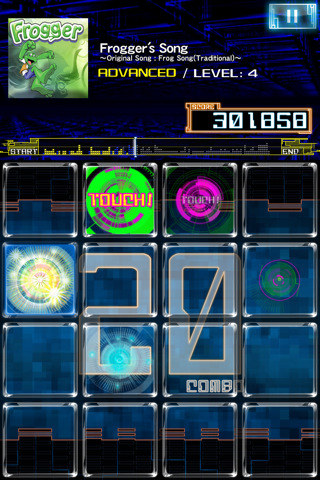
Konami’s Bemani games truly belong in a Japanese arcade. Surrounded by neon and noise, their natural home is simultaneously dazzling and deafening.
Remove them from that environment and they’re a fish out of water, an expensive footballer struggling to adapt to a new country.
Jukebeat – or jubeat as it’s known in the East – can be an astounding sensory experience in its original cabinet form. But take away the tactile joy of those 16 chunky buttons and the gaudy light show they provide and you’ve instantly lost much of the game’s appeal.
The art of noiseIt’s a pity, as on paper it seems a perfect fit for iOS. The idea of tapping square buttons on screen in time with music sounds tailor-made for the touchscreen of an iPad or an iPhone.
And it’s not because the mechanics have been poorly translated. Jukebeat purports to be a rhythm-action game, but in reality the visual cues are so late to emerge that it’s more like a music-themed Whac-A-Mole.
Admittedly, it’s much like that in its natural habitat, especially when your ears are being assaulted by the cacophonous racket that surrounds you.
Panel beaterBut somehow it’s easier to get in the zone as your hands dance across the panels. It’s not quite the same on a smaller screen – even on iPad (which is definitely the version to get, by the way).
Part of the reason it translates poorly is down to the choice of music. Three songs are supplied with the initial free download, but if you want to purchase any more, you’ll have to pay for one of a quartet of four-track packs, each costing £2.49.
The initial selection is weak, and very few of the songs enjoyed by fans of the Japanese original have made the journey across. Following hard on the heels of Groove Coaster, which carries 16 tracks from the off, the pricing feels a little cheeky.
Getting twitchyStill, if it’s a challenge you’re after, you’ll definitely find it here. Jukebeat starts off hard and gets harder – you might struggle to pass even the easiest songs on your first attempt. But then it’s always been designed as a test of memory, as much as of reflexes and rhythm.
Repeat plays yield satisfying rewards as you find your fingers gliding elegantly between touch points without thinking. Mastery doesn’t come easily, but there’s something hypnotic about watching an expert player at work.
Reaching that stage, though, is perhaps more of an attritional challenge than it should be, particularly given the format.
Beat itMany music games are all about memorising patterns, of course, but then a decent sense of rhythm is often enough to decipher tricky melodies and beats at the first attempt. That’s not the case here.
Sadly, it seems as if jukebeat will struggle to find an audience on iPad and iPhone, particularly as it’s almost certain to disappoint the two key demographics likely to show an interest in this port.
Fans of the arcade version will feel this is little more than a compromise, while those who’ve heard rave reviews might well wonder what all the fuss was about in the first place.
jukebeat

